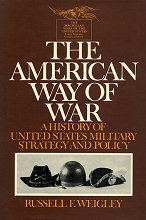
WEIGLEY : The American way of war (fülszöveg)
In this authoritative and controversial study, Russell F. Weigley traces the emergence of a characteristic American way of war—in which the object of military strategy has come to mean total destruction of the enemy, first of his armed forces, often of the whole fabric of his society.
Beginning with the American Revolution, Weigley examines the development of American military strategy and tactics, both in theory and practice, integrating the concept of strategy as a political, economic, diplomatic, and psychological means for attaining war aims with the actual application of strategic thought in war.
The first American strategists—George Washington, Nathanael Greene, and Winfield Scott—were restrained by the limitations of their resources and the temper of the times from adopting so ambitious a strategy and settled for more moderate aims. But during the Civil War the totalistic conception of war was brought to its apogee in bloodletting. Lee's strategy of "offensive-defensive" sacrificed thousands, while Grant's policy of annihilation was regarded even by Northerners as butchery. Generals in blue and gray were mesmerized by the image of climactic battle, as described in their West Point textbooks by Jomini and demonstrated by Napoleon at Austerlitz.
When World War I's inconclusive struggle showed the costliness of conventional land warfare, some American strategists looked for alternative glories in the seas and skies. As early as the 1920s, U.S. naval cadets were staging mock battleship duels with the Japanese fleet, but most American war planners of the 1930s looked forward to another herculean one-theater war against a European ground army.
As World War II began, the American strategy—as embodied in the Wedemeyer Plan—was to bring the enemy army to battle and annihilate it. Air power became an essential supplement, because the raining of bombs on an enemy—including civilians —could break the stalemates between land armies and even be justified morally as necessary to bring hostilities to a speedy end. Americans sought to duplicate their World War II success later in Vietnam, regarding it as another Germany, Weigley notes.
The postwar missile age has brought America a series of new possibilities—counterinsurgency, tactical nuclear war, and escalation to "massive retaliation." But Weigley feels these possibilities offer little promise of success. Paying special attention to the American involvement in Vietnam, he concludes with a serious discussion of why the traditional American way of war is no longer appropriate either to the existence of nuclear weapons or to confronting unconventional wars of national liberation.
The scope and erudition of Weigley's narrative open up new approaches to viewing military and cultural history. His probing analysis and important conclusions are essential reading for those who have practiced—and those who have doubted—the "American way of war."